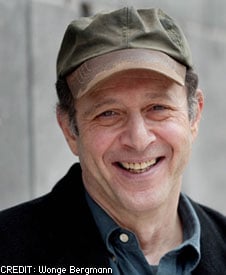Steve Reich: A 70th Birthday Celebration
 Seminal artist and composer Steve Reich |
In a career that has spanned more than four decades, Reich has been a seminal artist whose music not only influenced other musicians and composers, but also works of artists in all visual and other performing arts. In recognition of his birthday, Nonesuch Records released its second box set of Reich's works, Phases: A Nonesuch Retrospective, last September. The five-CD collection comprises fourteen of the composer's best-known pieces, spanning his 20 year association with the label.
However, it was Mr. Reich's 1969 and 1978 concerts at the Whitney that were among the most important of his early career, as they lead to concerts there in 1981 and 1993 which further cemented his reputation as a modern American master.
In recognition, on October 15, the Whitney presented a mini-marathon of Reich's music performed by groups including the Manhattan School of Music Contemporary Ensemble, TACTUS. The concert featured works premiered at the Whitney in the 1960s and 1970s, such as Pendulum Music. Among compositions performed were Proverb; Music for Mallet Instruments, Voices and Organ; Four Organs; Piano Phase; Six Marimbas; Pendulum Music; Eight Lines; Vermont Counterpoint; New York Counterpoint; and Clapping Music. Flautist Ransom Wilson also performed Vermont Counterpoint, originally written for him. In addition, from October 4 to 15, the Whitney's Kaufman Astoria Studios Film and Video Gallery screened the documentary digital video opera Three Tales (1998-2002), created by Reich and video artist Beryl Korot, which examines technology milestones of the 20th century.
Recently called "the most original musical thinker of our time" by The New Yorker and "among the great composers of the century" by The New York Times, Reich, from his early taped speech pieces It's Gonna Rain (1965) and Come Out (1966) to the video opera Three Tales, has embraced not only aspects of Western classical music, but the structures, harmonies, and rhythms of non-Western and American vernacular music, particularly jazz.
"There's just a handful of living composers who can legitimately claim to have altered the direction of musical history and Steve Reich is one of them," states The Guardian (London).
At the recent Brooklyn Academy of Music concert, Reich had requested two Yamaha CFIIIS concert grand pianos to be on stage. This was his request at the Whitney concerts as well. Curators for both of these performances said Reich was very specific in his requests for these instruments and he had spoken of his appreciation of the instrument's tone and its technical dependability.
For more information, write Yamaha Corporation of America, Piano Division, P.O. Box 6600, Buena Park, CA 90622, telephone (714) 522-9011, or e-mail infostation@yamaha.com.
